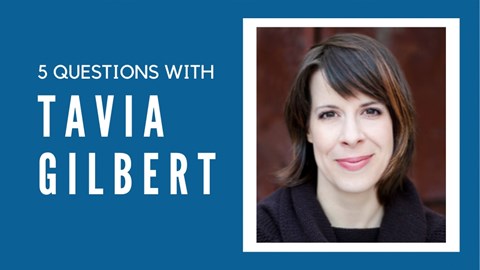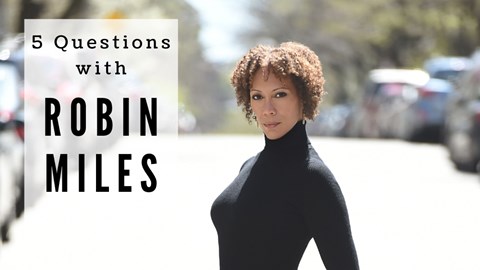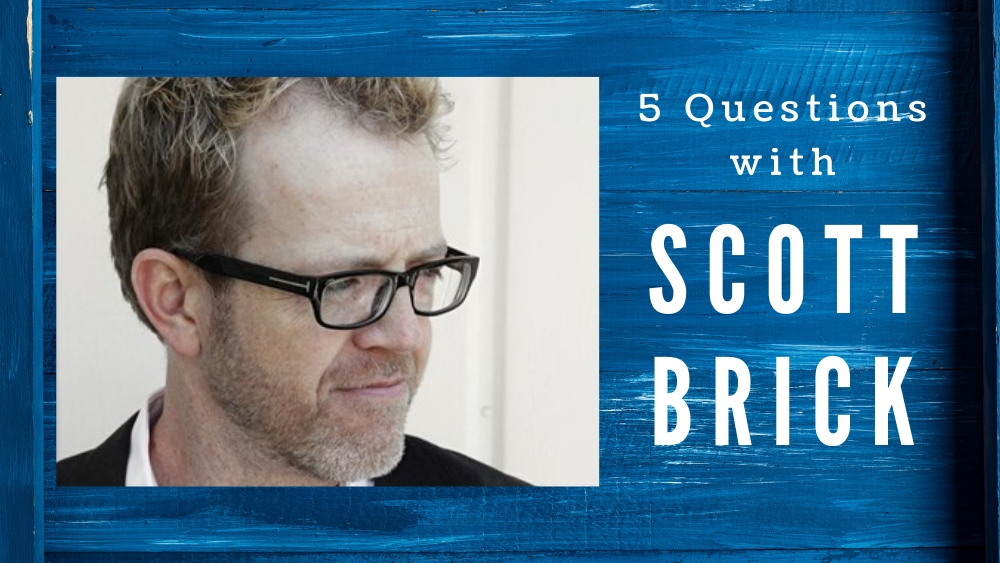
Today’s guest narrator is the voice of some of my favorite series. If you’ve ever listened to a book by Brad Meltzer, Clive Cussler, or Nelson DeMille, then you’re already familiar with audiobook star Scott Brick. Scott has also guided listeners through history, mystery, science fiction, and fantasy, gaining fans across the genres.
I look to Scott for a vibrant, engaging delivery that holds my attention from the moment I hit play to the very last second of the audiobook, from action-packed thrillers to well-researched biography. I especially appreciate his impeccable sense of timing and the way he can pump up chase scenes, draw out the suspense, and linger over descriptive prose, all of which builds strong connections between listener and author.
Don’t take my word for it, though. Download one of today’s recommended audiobooks and hear for yourself.
5 Audiobooks
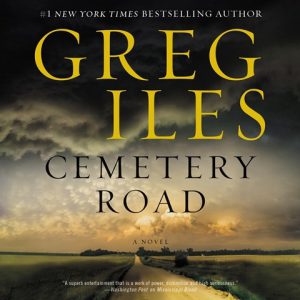 Greg Iles’s CEMETERY ROAD exposes the sometimes ugly underbelly of a small Mississippi town. Part thriller, part family story, and part political commentary, this stand-alone novel features Marshall McEwan, who leaves his successful Washington journalism career to return home to care for his declining alcoholic father. Murder, backroom business deals, questionable politics, and women doing whatever they can to get by round out the action. Scott’s Earphones Award–winning performance highlights the town’s socioeconomic divide and Marshall’s conflicted reactions to his father’s illness and to what he learns about the people he grew up with.
Greg Iles’s CEMETERY ROAD exposes the sometimes ugly underbelly of a small Mississippi town. Part thriller, part family story, and part political commentary, this stand-alone novel features Marshall McEwan, who leaves his successful Washington journalism career to return home to care for his declining alcoholic father. Murder, backroom business deals, questionable politics, and women doing whatever they can to get by round out the action. Scott’s Earphones Award–winning performance highlights the town’s socioeconomic divide and Marshall’s conflicted reactions to his father’s illness and to what he learns about the people he grew up with.
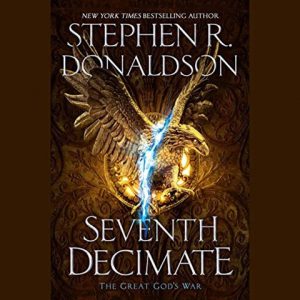 A hidden sorcerers’ library is at the heart of Stephen R. Donaldson’s Great God’s War trilogy, which begins with SEVENTH DECIMATE. In order to finally end the centuries-long war waged against a neighboring kingdom, the realistically flawed Prince Bifalt sets off on a quest to seek knowledge about a rumored power that will bring victory to his people. Bifalt’s journey is made all the more urgent because his realm’s sorcerers have suddenly and mysteriously lost their magic. Scott gives each character a unique voice and infuses the narrative and dialogue with emotion—wonder, anger, frustration, and hope—making it easy for us to root for the prince’s success.
A hidden sorcerers’ library is at the heart of Stephen R. Donaldson’s Great God’s War trilogy, which begins with SEVENTH DECIMATE. In order to finally end the centuries-long war waged against a neighboring kingdom, the realistically flawed Prince Bifalt sets off on a quest to seek knowledge about a rumored power that will bring victory to his people. Bifalt’s journey is made all the more urgent because his realm’s sorcerers have suddenly and mysteriously lost their magic. Scott gives each character a unique voice and infuses the narrative and dialogue with emotion—wonder, anger, frustration, and hope—making it easy for us to root for the prince’s success.
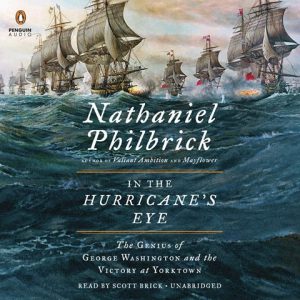 To gain a sense of Scott’s narrative range, cue up IN THE HURRICANE’S EYE: The Genius of George Washington and the Victory at Yorktown by Nathaniel Philbrick. This conclusion to Philbrick’s nonfiction Revolutionary War trilogy focuses on how the French navy paved the way to the all-important American victory at Yorktown. The period details, the historical figures, and the battles on land and sea come alive via Scott’s down-to-earth delivery, believable French pronunciations, and excellent pacing. History buffs shouldn’t miss the winning combination of Philbrick’s prose and Scott’s voice.
To gain a sense of Scott’s narrative range, cue up IN THE HURRICANE’S EYE: The Genius of George Washington and the Victory at Yorktown by Nathaniel Philbrick. This conclusion to Philbrick’s nonfiction Revolutionary War trilogy focuses on how the French navy paved the way to the all-important American victory at Yorktown. The period details, the historical figures, and the battles on land and sea come alive via Scott’s down-to-earth delivery, believable French pronunciations, and excellent pacing. History buffs shouldn’t miss the winning combination of Philbrick’s prose and Scott’s voice.
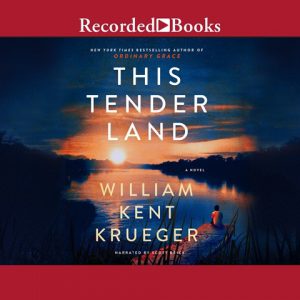 You may be familiar with author William Kent Krueger through his Cork O’Connor mystery series, but did you know that Krueger also writes general fiction? THIS TENDER LAND, set during the Great Depression, follows the canoe journey of four children who escape a school for Native Americans to find their place in the world. Loosely based on The Odyssey, the audiobook covers a number of themes, such as self-discovery, spiritualism, and racial prejudice. The story is told in retrospect, and Scott’s performance nicely balances the elderly man’s recollections with the in-the-moment experiences of the children all those years earlier.
You may be familiar with author William Kent Krueger through his Cork O’Connor mystery series, but did you know that Krueger also writes general fiction? THIS TENDER LAND, set during the Great Depression, follows the canoe journey of four children who escape a school for Native Americans to find their place in the world. Loosely based on The Odyssey, the audiobook covers a number of themes, such as self-discovery, spiritualism, and racial prejudice. The story is told in retrospect, and Scott’s performance nicely balances the elderly man’s recollections with the in-the-moment experiences of the children all those years earlier.
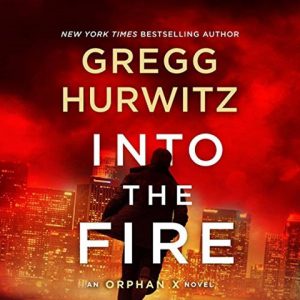 In a brilliant bit of casting, Scott was tapped to narrate Gregg Hurwitz’s Orphan X novels about former FBI hit man Evan Smoak, also known as Orphan X or the Nowhere Man. The latest action-packed installment is INTO THE FIRE, in which Smoak agrees to help a desperate man who needs answers and protection after his cousin is murdered. This audiobook, and the entire series, showcases Scott’s skills at finding the tempo of the story and digging down to convey the complexities of a character whom we want to cheer for despite his questionable methods for helping his clients.
In a brilliant bit of casting, Scott was tapped to narrate Gregg Hurwitz’s Orphan X novels about former FBI hit man Evan Smoak, also known as Orphan X or the Nowhere Man. The latest action-packed installment is INTO THE FIRE, in which Smoak agrees to help a desperate man who needs answers and protection after his cousin is murdered. This audiobook, and the entire series, showcases Scott’s skills at finding the tempo of the story and digging down to convey the complexities of a character whom we want to cheer for despite his questionable methods for helping his clients.
5 Questions
Whether you’re already a fan of the fabulous Scott Brick or you’re just discovering his audiobook performances, I hope you found some new titles to add to your wish list. Before you hit that play button, Take 5 to listen in as I ask Scott a few questions about his life in and out of the recording booth.
AudioFile: Tell us something surprising about yourself.
Scott Brick: I’m passionate about baking. Seriously, I’m nuts, and pretty ambitious at what I attempt. I’ve actually been offered a job as a professional pastry chef twice and even had someone offer to fund me if I wanted to start my own business, but I quickly found out it wasn’t as much fun when I had to do it on a really tight schedule, plus it would’ve kept me out of the studio, so I’ve kept my amateur status instead. But my TV is constantly set to baking competitions—they’re always on when I’m in the kitchen or unwinding after a long day in the studio. My grandmother used to garden almost every day, she said it relaxed her, and I think baking is my version of that.
AF: What are you doing when you’re not working?
SB: Reading biographies of film stars and books about the golden age of Hollywood. I’m especially fascinated by the silent era. In the last week I’ve finished bios of Roscoe Arbuckle, Douglas Fairbanks, and even Florence Lawrence, who sadly no one remembers anymore but was the very first performer who ever had her name listed in the credits of a film. Actors had always been anonymous up to that point, so she’s referred to as the World’s First Movie Star. I was stunned to learn she lived only a half block from my house! There’s just something about that era that fascinates me to no end. It’s actually inspired me to possibly do some of these books on audio. They may sell only a dozen copies, but they would be so much fun to work on! I’m starting my dream project three weeks from now, we’re recording ROUND UP THE USUAL SUSPECTS: The Making of Casablanca, the greatest movie of all time. I tracked down the author; she’s 90 years old and living not far from me, so we’re hoping to get her into the studio to talk about it and include the interview at the end of the book. Projects like that one are what Heaven looks like to me.
AF: What’s the first task you tackle when given a new audiobook project?
SB: Typically, the first thing I do is send the manuscript to my researcher, who goes through it and finds every word that I could conceivably stumble over, especially words or phrases from foreign languages that I’ll have to read convincingly. Once the book is back in my hands, if it’s fiction, then the first thing I do is something I never do when I read for pleasure, and that’s read the ending first. The reason for this is so I can see the arc of the main character: What are they like at the beginning of the book, and what will they be like by the end? That’s the arc I’m going to have to convey, and it helps me to map it out in my head as I’m going. Many people think the word protagonist means the lead character, but it actually means the character who changes. Does the character begin as someone who’s somewhat intolerant, perhaps? Prejudiced against a particular race, or gender, or persuasion? Well, if the point of the story is that they see the error of their ways at the end, then I need to know that ahead of time so that every single time that character comes in contact with someone from the group he’s intolerant toward I can raise the stakes just a little bit, I can look for ways to illustrate that change subtly as the story progresses, so it doesn’t come as a huge surprise. Really great authors aren’t afraid to change the status quo, even in ongoing series, and it’s my job to portray those changes as effectively as I can. That’s why I’m going back and reading Lee Child’s Jack Reacher books from the beginning, in chronological order rather than publishing order, because I’m able to see the changes in him that took place in the books before I was working on the series, and it makes the character as he currently is even more lifelike. Well, I’m also doing it because they’re absolutely amazing, but that’s beside the point!
AF: Is it difficult to avoid foreshadowing, especially when recording a book with a twist?
SB: Good authors always foreshadow, but they put it in for a specific reason, so my challenge is to not get caught doing it. The author wants the listener to think their red herring character is the killer, so it’ll make it even more shocking when it turns out to be the one who seemed entirely innocent. My job is to make that red herring character as unlikable as I can—again, without getting caught—and to simultaneously make the real villain as nice and friendly as possible. And sometimes you’re stuck, because the killer will speak to his henchmen on the phone, but because the listener doesn’t know who’s speaking, I can’t use the Irish or German or Russian accent I’d typically use if that’s where the killer is from. But that character may show up throughout the book, and if he’s described as having an accent, I have to use one in those sections. Which means that, until that character is revealed as the villain, I have to perform them inconsistently, without an accent, which is going to be jarring for the listener. Damned if you do and damned if you don’t. In the end, I have to prioritize the element of surprise that the author’s worked so carefully to create over making things easier for the listener by being consistent.
AF: What genre will you always say yes to and why?
SB: Science fiction, forever and always, because I’ve been reading it voraciously since I was a kid. Plus, I learn a great deal while working in the genre, as some of these characters and situations are hugely challenging. My favorite author, Stephen R. Donaldson, introduced an alien race that was described as having voices that sounded like the slow accumulation of rust. Seriously? But you have to figure out how to make it work. The biggest challenge of my career was a sequence in SOMETHING MORE THAN NIGHT by Ian Tregillis. At one point, a character splits in two and does two things simultaneously, and okay, fine, all good, but the text split, too: vertically, down the center of the page, written so you can read both side by side. But, on audio? That’s not going to happen. That was a head scratcher, but it felt great when I figured it out, and I love being challenged like that. We don’t get better without being tested in some way, right?
—
Thanks so much for taking the time to talk with us, Scott. Wow on the split character; I’m impressed you found a solution (and now I have to listen to the book!). Here’s hoping you don’t run out of flour in the weeks to come; baking truly is a great way to relax.
To discover more books performed by Scott Brick, be sure to browse our reviews.



